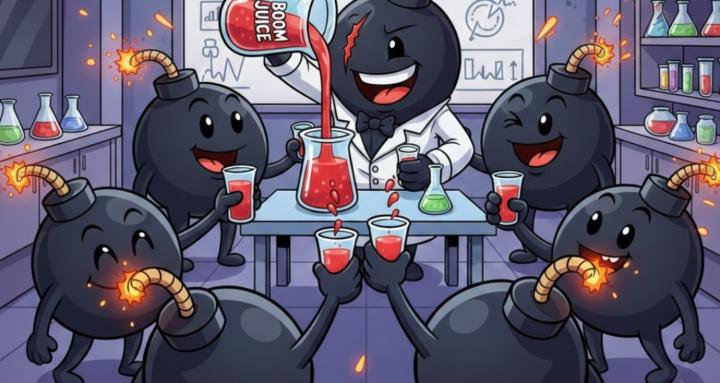
Write something
Any advice on scaling and team growth? I’d love to hear your thoughts.
Planning on scaling up my real estate team. Any general advice/things to avoid?
Money Attracts 🧲 More Money
Since I was young, I’ve been fascinated with the way money is used to magnetize more money. I still remember as a kid the first time I looked at my little savings account passbook and saw interest added on top of what I already had. The idea that money could quietly work for me—even while I was asleep—blew my mind. That’s the power of compounding. (Book plug: The Compound Effect by Darren Hardy) And compounding doesn’t just happen with money. Think about learning a new skill or building a relationship. Every small rep stacks on the one before it. Until one day, the results feel exponential. A few pages read each day turns into a library in your mind. A few intentional conversations can eventually transform into a deep, life-changing network. Fast forward to today, and it’s probably why the Infinite Banking Concept resonates so strongly with me. It’s the same principle, just leveled up: putting your dollars to work, over and over, instead of letting them sit idle. One example from my life was when I decided to become a runner. 👟 Running was always a thing I did, but it was usually a component of another game or sport. Not the whole enchilada. But when I decided to "just run" as long and far as I could, it was unimpressive. But I kept doing it. And by the time I completed my first 10K, my lung capacity, lower body endurance, and stride at all improved. So I kept going with it and eventually completed the NYC Half Marathon under my target time. Credit compounding at work. (That was 2017, and let's just say that reverse compounding has been in play for a while now 😆) Here’s a thought to chew on:👉 If compounding is always at work—whether in money, skills, or relationships—where is it working for you right now… and where might it actually be working against you?
I Hate Insurance
I’ll be honest—I hate insurance. Maybe it’s because I’m a gambler. A risk taker. An entrepreneur. But long before I had a business or owned a home, I was never fond of the idea of hedging a bet. Paying premiums to protect against “what ifs” felt like losing money. I’d rather bet on myself, my work ethic, and my ability to bounce back. But that feeling only got worse once I became a business owner. - I’ve lived through 1000% increases on GL premiums—all because of reporting a single loss. - I’ve seen workers comp claims drain us and force us into endless paperwork. - I’ve fought with unemployment claims that never should’ve been approved. - I’ve dealt with brokers who lacked transparency, foresight, or even the courage to prepare me for the real costs. Every step of the way, insurance has felt like a punishment for building something—when all I ever wanted was protection and clarity. So yeah, I hate insurance. But here’s the paradox: I still pay it. Because I have to. Because risk is real. Because I have people depending on me. And maybe that’s why I’m drawn to the Infinite Banking Concept. Because it flips the script: it turns “life insurance” into a tool for freedom instead of a tax on fear. For me, insurance is tolerable only when it’s reframed as assurance: - Assurance that I’m in control. - Assurance that my money works for me, not just for a carrier. - Assurance that I can take risks without leaving my family or my people exposed. So yeah, I still hate insurance. But I like what it can become when you run it through a BoomZeal filter. Collaboration Prompt: - What’s your gut reaction when you hear the word insurance? - Where’s the line between betting on yourself and being reckless?
Banking On Yourself
In true BoomZeal fashion, I didn’t just learn about the Infinite Banking Concept (IBC)… I went all in. I believe in the power of controlling your own money, becoming your own banker, and refusing to rely on institutions that profit off our lack of discipline and vision. That belief led me to: 1. Study IBC as a student. 2. Become a practitioner in my own life. 3. And then—get licensed as a NYS life insurance agent so I can teach and share it. Why? Because BoomZeal isn’t about “good enough.” It’s about raising the standard. And if I’m going to talk about financial freedom, discipline, and legacy, then I’ve got to live it. I can’t just point to a book—I’ve got to be the book. IBC is one of the ultimate examples of the BoomZeal Effect: doing the inside work (discipline, patience, understanding money) before the outside results (wealth, freedom, impact) show up. --- When you think about your finances, where have you been “good enough”—and what’s the cost? Do you believe everyday people should become their own bank, or is that too radical? What’s one financial principle that changed how you see money forever? This isn’t about selling policies—it’s about rewriting the standard of how we build wealth. Because BoomZeal in money, just like in life, means never settling for “good enough.”
0
0
1-4 of 4
powered by

skool.com/boomzeal-1105
Laboratory for the driven few who choose to lead the scarred many. Collectively waging war against mediocrity. We ain't scared, we're S.C.A.R.D. ! 💥
Suggested communities
Powered by

